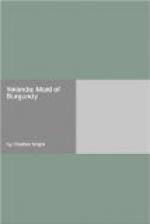“Max!” After a pause I continued, “Leave murder to the Italians.”
Max uttered a snort of disdain, but, as usual, he took my advice. He turned to Campo-Basso, still grasping his battle-axe:—
“Keep that fellow away from me,” he said, pointing toward Calli. “My merciful mood was brief. By the good God who gave me the villain’s life, I will kill him if he comes within reach of my axe.”
An Italian ran to the men who had Calli in charge, and they turned at once and hurried toward the south gate of the lists. All this action was very rapid, consuming only a minute or two, and transpired in much less time than it requires to tell of it.
While our squires were removing Max’s armor, I heard the duke say:—
“Arrest Calli. We will hold him until the shot is explained. If he was privy to it, he shall hang or boil.” Then the duke, placing his hand on Max’s shoulder, continued: “You are the best knight in Christendom, the bravest, the most generous, and the greatest fool. Think you Calli would have spared you, boy?”
“I am not Calli, my lord,” said Max.
“You certainly are not,” returned the duke.
Visions of trouble with France growing out of Yolanda’s “t,” and of a subsequent union between Max and the princess, floated before my mind, even amidst the din that surrounded me. Taking the situation by and large, I was in an ecstasy of joy. Max’s victory was a thousand triumphs in one. It was a triumph over his enemy, a triumph over his friends, but, above all, a triumph over himself. He had proved himself brave and merciful, and I knew that in him the world had a man who would leave it better and happier than he found it.
Calli was arrested and brought to the duke’s presence. Of course he denied all knowledge of the shot that had killed Max’s horse. Others were questioned, including three Italian friars wearing cassocks and cowls, who bore a most wondrous testimony.
“Your Grace,” said one of the friars, “we three men of God can explain this matter that so nearly touches the honor of our fair countryman, the noble Count Calli.”
“In God’s name, do so,” exclaimed the duke.
“This is the explanation, most gracious lord. When the third course was preparing, we three men of God prayed in concert to God the Father,”—all the friars crossed themselves,—“God the Son, and God the Holy Ghost, to save our countryman, and lo! our prayers were most graciously answered; for, noble lord, at the moment when this most valiant knight was about to kill our friend, we each heard a report marvellously like to the discharge of an arquebuse. At the same instant a fiery shaft descended from the palm of a mighty hand in the heavens, and the horse of this valiant and most generous knight, Sir Max, fell dead, stricken by the hand of God.”
I had no doubt that this absurd explanation would be received with scorn and derision; but the friar knew his audience, and I did not. His statement was not really accepted as true, but it was not cast aside as utterly absurd. I saw that it might easily be believed.




